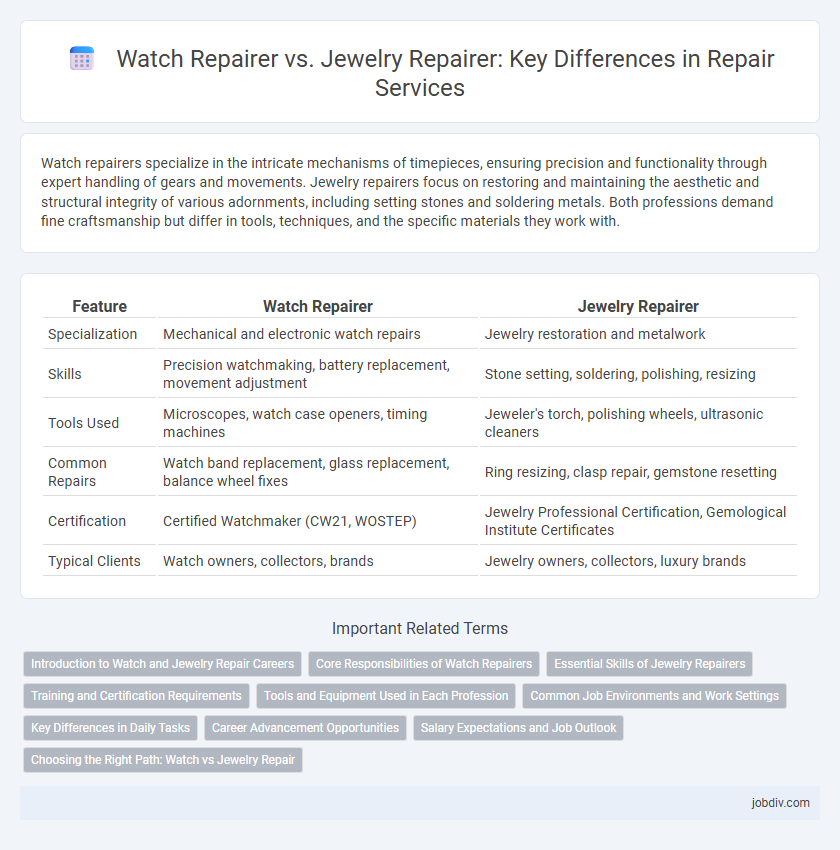Watch repairers specialize in the intricate mechanisms of timepieces, ensuring precision and functionality through expert handling of gears and movements. Jewelry repairers focus on restoring and maintaining the aesthetic and structural integrity of various adornments, including setting stones and soldering metals. Both professions demand fine craftsmanship but differ in tools, techniques, and the specific materials they work with.
Table of Comparison
| Feature | Watch Repairer | Jewelry Repairer |
|---|---|---|
| Specialization | Mechanical and electronic watch repairs | Jewelry restoration and metalwork |
| Skills | Precision watchmaking, battery replacement, movement adjustment | Stone setting, soldering, polishing, resizing |
| Tools Used | Microscopes, watch case openers, timing machines | Jeweler's torch, polishing wheels, ultrasonic cleaners |
| Common Repairs | Watch band replacement, glass replacement, balance wheel fixes | Ring resizing, clasp repair, gemstone resetting |
| Certification | Certified Watchmaker (CW21, WOSTEP) | Jewelry Professional Certification, Gemological Institute Certificates |
| Typical Clients | Watch owners, collectors, brands | Jewelry owners, collectors, luxury brands |
Introduction to Watch and Jewelry Repair Careers
Watch repairers specialize in the intricate mechanics of timepieces, requiring skills in micro-soldering, gear alignment, and battery replacement. Jewelry repairers focus on metalwork, stone setting, and polishing techniques to restore or customize rings, necklaces, and other adornments. Both careers demand precision, attention to detail, and knowledge of specialized tools and materials.
Core Responsibilities of Watch Repairers
Watch repairers specialize in diagnosing and fixing mechanical and electronic issues in timepieces, including cleaning, lubricating gears, and adjusting movements to ensure accurate timekeeping. They use precision tools to disassemble intricate components, replace broken parts like springs and crystals, and test functionality under various conditions. Proficiency in microengineering and familiarity with different watch brands and models distinguish their core responsibilities from those of jewelry repairers.
Essential Skills of Jewelry Repairers
Jewelry repairers must possess precision craftsmanship and a deep understanding of various metals, gemstones, and settings to restore delicate pieces effectively. Proficiency in soldering, polishing, and stone-setting techniques is essential for maintaining the aesthetic and structural integrity of fine jewelry. Strong attention to detail and expertise in color matching and metal alloys ensure high-quality repairs that meet client expectations.
Training and Certification Requirements
Watch repairers typically require specialized training in horology, often completed through accredited watchmaking schools or apprenticeship programs, culminating in certifications such as those from the American Watchmakers-Clockmakers Institute (AWCI) or the Swiss WOSTEP. Jewelry repairers usually undergo training through trade schools or on-the-job experience focusing on metalworking, stone setting, and soldering techniques, with certifications available from organizations like the Gemological Institute of America (GIA). Both professions demand precision and technical skills, but watch repair certification emphasizes mechanical and electronic movement expertise, whereas jewelry repair certification centers on craftsmanship and gem handling.
Tools and Equipment Used in Each Profession
Watch repairers rely on precision tools such as jeweler's screwdrivers, watch case openers, and timing machines to service intricate timepieces. Jewelry repairers use soldering torches, polishing wheels, and stone-setting tools to restore and customize fine jewelry. Both professions require specialized equipment, but watch repair emphasizes delicate mechanical components, while jewelry repair focuses on metalwork and gemstone handling.
Common Job Environments and Work Settings
Watch repairers and jewelry repairers commonly work in professional settings such as workshops, retail stores, and specialized service centers, where precision and attention to detail are critical. Both professions require controlled environments with adequate lighting and the use of specialized tools to handle delicate components. Watch repairers often work at repair benches equipped with magnification devices, while jewelry repairers frequently use soldering stations and polishing equipment within their workspaces.
Key Differences in Daily Tasks
Watch repairers specialize in intricate mechanisms, focusing on delicate gear alignment, battery replacement, and time calibration to ensure precise functionality. Jewelry repairers handle tasks such as soldering broken chains, resizing rings, and polishing gemstones to restore aesthetic appeal and structural integrity. Both professions require fine motor skills but differ significantly in material focus and technical processes.
Career Advancement Opportunities
Watch repairers specialize in intricate mechanical and electronic components, offering advancement opportunities through certifications in horology and high-end watch servicing. Jewelry repairers develop skills in metalworking, stone setting, and engraving, leading to career growth in custom design, appraisal, and luxury brand partnerships. Both careers benefit from experience and technical proficiency, but watch repairers often progress into specialized roles within luxury watch manufacturing or restoration.
Salary Expectations and Job Outlook
Watch repairers typically earn a median annual salary of around $40,000 to $50,000, with demand driven by the luxury watch market and mechanical timepieces' maintenance needs. Jewelry repairers often have a slightly higher income range, approximately $45,000 to $55,000 annually, due to their broader skill set involving precious metals and gemstones. Job outlook for both professions is stable but varies regionally, with watch repairers seeing steady opportunities linked to horology trends and jewelry repairers benefiting from consistent consumer spending on fine jewelry maintenance and restoration.
Choosing the Right Path: Watch vs Jewelry Repair
Selecting between watch and jewelry repair hinges on specialized skills and passion for precision or artistry. Watch repairers require expertise in micro-mechanics and intricate timing systems, while jewelry repairers focus on metalwork, stone setting, and restoration techniques. Market demand and investment in tools also influence the best path for career growth in the repair industry.
Watch Repairer vs Jewelry Repairer Infographic

 jobdiv.com
jobdiv.com